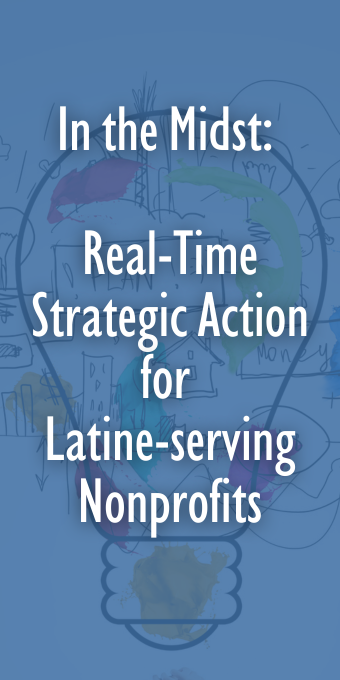In the Midst: Real-Time Strategic Action for Latine-serving Nonprofits
The nonprofit sector is no stranger to change, but the unprecedented and drastic policy shifts and actions by the current administration have placed a particular burden on Latine-serving organizations.
While all nonprofits are grappling with significant challenges — such as funding instability; the attack on diversity, equity, and inclusion; and the authoritarian threat of losing 501(c)(3) status — Latine-serving organizations must also navigate the additional, immediate needs of their communities including fears surrounding participation in programs, general anxieties among Latine families, and economic instability due to employment concerns.
At La Piana Consulting, our Vías* team has gained firsthand insight into the unique challenges that Latine-serving organizations are currently facing. Drawing from successful approaches we’ve observed and our own expertise, we’ve compiled key issues alongside potential actions to navigate them.
Funding Instability
Particularly for organizations explicitly serving Latine communities, shifts in federal and state funding priorities raise serious concerns about long-term sustainability and the ability to serve communities effectively.
Scenario mapping is one potential approach to help address this, by envisioning multiple potential futures (e.g., stages of funding cuts, legislative changes, staffing changes, loss of clientele, etc.) and preparing for different possibilities. This approach helps organizations anticipate potential challenges and develop contingency plans instead of reacting in crisis mode.
Steps you can take include:
- Designate a scenario mapping committee to accomplish this work
- Add an environmental scan discussion to staff and board meeting agendas to touch base on local, national, and sector news
- Talk with current funders and donors to gauge the future of funding, and see if any restrictions can be lifted or additional funds can be provided
Immigration Policies and Fear
Uncertainty around immigration policies can lead many to avoid public spaces, schools, and even vital nonprofit programs due to fear of detention or deportation.
Potential approaches to address this include:
- Consider providing/expanding virtual or mobile services so clients don’t have to risk travel (e.g., delivering food pantry bags to clients, moving therapy services online, etc.).
- Collect as little identifiable information as possible. Consider how to engage clients for signups or surveys without a digital trail (e.g., encrypted phone calls, paper signups, in person conversations). If client information is stored, can any of it be deleted? Are there pieces of information that might be risky or cause harm to the client should it be seized?
- Review your organization’s digital security and privacy policies regularly, including a review of apps, software, and databases. Provide digital security training to staff, board, and clients.
- Consider safety measures for in-person programs and events — Who is invited and/or knows about the event? Where is it advertised? Will the use of phones/cameras be allowed? Is attendance recorded somehow? Will photos and/or other recaps be shared on social media?
- Invite trusted clients who have personal experience into an interview to understand their perspective and help inform your organization’s approach.
- Issue Red Cards and/or other relevant information to staff and clients to increase Know Your Rights awareness.
Challenges to DEIJ Initiatives
Policies targeting Diversity, Equity, Inclusion, and Justice (DEIJ) programs make it harder for organizations to advocate for marginalized communities without risking scrutiny or funding cuts.
Potential responses to this include:
- Keep up to date on the latest Executive Orders from trusted sources, like tracking from the National Council on Nonprofits
- Talk with peers and form local coalitions and partnerships to stand strong together. Individuals and families are fearful right now — staying vocal and proud about your values and culture, arm-in-arm with others, provides hope and builds power.
- Discuss these challenges with funders to try to mitigate any cuts or conflicts before they arise.
- Demonstrate your commitment to equity, even if it’s not explicit in the words that you publish — actions speak louder than words. If you’re concerned about funding and client security, you can do this discreetly (but only as a last resort; we don’t recommend backing down unless it’s your only viable option).
Daily Barriers to Accessing Services
Families and individuals may be reluctant to engage with support services due to heightened anxiety, fear for their safety, misinformation, and systemic barriers.
To help your staff and constituents:
- Review police and security collaboration, providing clarity around who/what it is and why they are present at programs, events, etc. Make an effort to overcommunicate, and to create and update safety and security protocols, including digital security.
- Remove unnecessary and/or old data about your clients. What information do you actually need to collect in order to provide services?
- Place clear signage throughout your spaces indicating who can and cannot access those spaces.
Staff Stress from Effects on Personal and Work Life
Latine staff often serve the communities they come from or identify with, and they are experiencing these policy changes as individuals, not just staff. Paying close attention to staff needs, and promoting connection and conversation, is critical not only to strengthening staff wellbeing, but also to retaining staff during times of great need.
Keep these tips in mind to help your staff manage stress:
- The nonprofit sector thrives on collaboration. Connecting with other leaders who are facing similar challenges allows for the exchange of ideas, resources, and strategies. A simple conversation with a fellow executive director can offer valuable insights and reassurance.
- New challenges bring new tasks to staff desks. Workloads should be a regular conversation with supervisors to review what can be released to address new, immediate priorities.
- Travel and remote work policies for staff should be reviewed, expanding remote and flexible work options whenever possible (e.g., flexibility for a staff member to come in late to avoid an ICE checkpoint, mental health days for staff, remote work to help staff rest, etc.)
- With staff permission, assess the need to remove any potentially identifying information from staff bios on websites.
- Provide gift cards or time during the day for staff to go get coffee or lunch with colleagues or with staff from a peer organization. Even better if you can support a local BIPOC-owned small business.
- For any trainings provided, invite other nonprofit leaders and staff. Not only can this be financially helpful to share facilitator costs, but also provides opportunities for interpersonal connection and organizational partnership.
Additional Observations and Recommendations
Beyond the suggestions above, you might consider investing in broader efforts related to organizational development and strategy.
- Strategy Development – In the face of current challenges, nonprofit leaders must make critical decisions quickly and effectively. Rather than waiting for a comprehensive planning process, bring your leadership team together to focus on the most pressing issues. Identify your organization’s critical priorities — your “Big Questions” — and create a short-term, three-month action plan to act as a living document for addressing these questions, monitoring and pivoting along the way, as needed. Strategy can no longer be something to address “when the time is right”— the time is now.
- Coaching and External Support – Engaging professional consultants, coaches, or advisors can provide tailored guidance for navigating uncertainty and ensuring leadership teams have the necessary support to make informed decisions.
- Explore Partnerships – Consider formal partnerships or even mergers with complementary organizations.
- Legal Counsel – Given the magnitude of legal shifts we are experiencing and the uncertainties that these shifts create for nonprofits, be sure to have trusted relationships with legal experts to serve as a resource for navigating new Executive Orders and any sudden targets on your nonprofit and/or communities.
What Steps Are You Taking?
At La Piana Consulting, we understand the pressures Latine-serving nonprofits face, and we are committed to supporting organizations as they navigate these complex times. While the suggestions above may offer a starting point, this list is not exhaustive. Each organization has unique needs that can only be truly understood by listening to its staff and community members. The core of our message is simple: talk to one another, support one another, and take steps to be as prepared as possible.
We encourage you to review these suggestions with your team, a peer, or a mentor. Consider what actions can be taken immediately, in the coming week, and in the next month. Integrate these tasks into agendas, convene necessary meetings, and work collaboratively. Consistent, small steps will position your organization to better weather this storm. Most importantly, remember: todos estamos juntos.

*The Vías practice at La Piana Consulting grows from our experience spanning over twenty-five years consulting to the social sector. Led by Luis Vergara, Head of Practice at La Piana, with nearly three decades of experience as a nonprofit leader and consultant, Vías has attracted a stellar team of experienced consultants including Estephany Mendoza, Humberto Camarena, and Olivia Audsley. For more information, visit https://www.lapiana.org/services/vias-latine-centered-consulting/.



Comment section